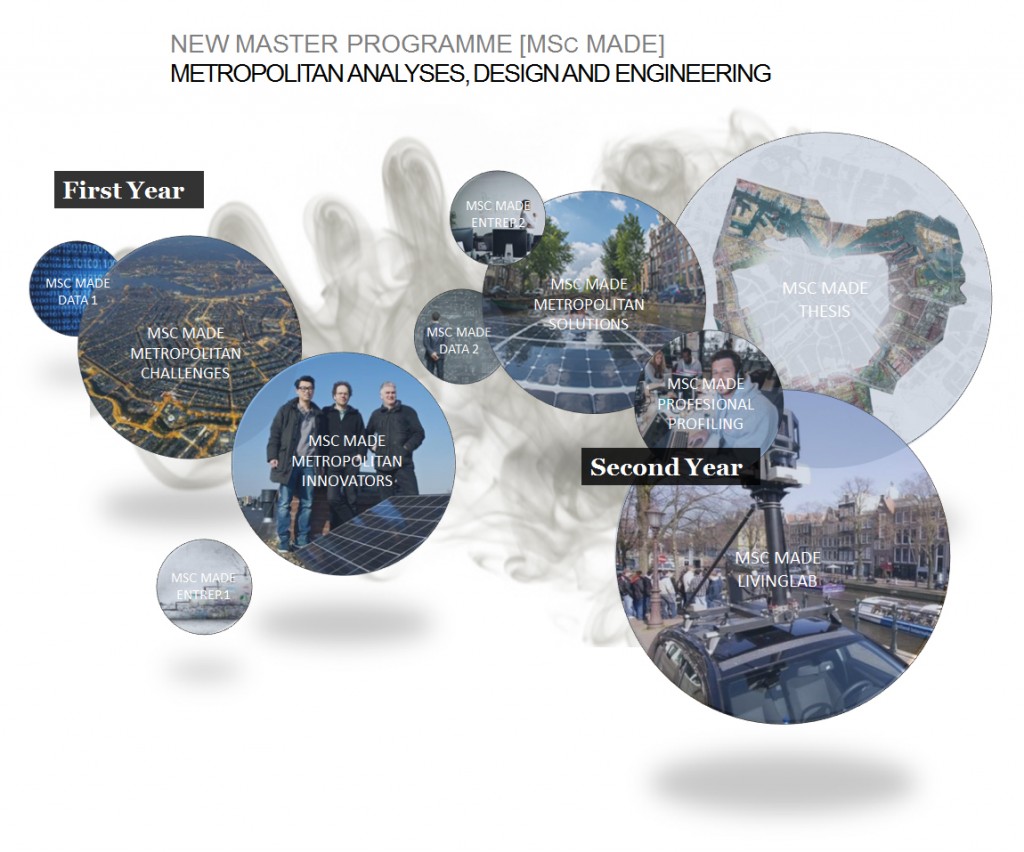As the majority of the world population is living in cities today, urban environments have become a place for many people. We are obliged to aim at sustainability and safeguard people’s quality of life, and human wellbeing. These challenges are motivating science and society to approach metropolises differently. Advanced metropolitan solutions to overcome problems are being made possible by today’s revolution of new technologies, theories and methods. But no actor or stakeholder can make metropoles move in one certain direction. Metropolitan solutions require cooperation between knowledge institutes, companies, governments, between cities, citizens and civil society.
The new MSc programme Metropolitan Analysis, Design and Engineering (MADE) integrates analysis, design and engineering in the sphere of the flows in the city; the physical, digital and social environments; and the city and its citizens. As full master programme, the MSc MADE prepares students to be specialised on one hand and an integrator on the other. A MADE graduate will be able to create synergy between specialists from other disciplinary backgrounds. You can make a cross-over too!

The new trans- and interdisciplinary programme will be offered as a joint degree programme by Delft University of Technology and Wageningen University. It is built on their joint research activities, and consolidated in their participation together with the Massachusetts Institute of Technology (MIT) in the Amsterdam Institute for Advanced Metropolitan Solutions (AMS).
The heart of the MADE programme relates to [i] the flows of the city, [ii] sensing the city, designing solutions, and integrating technology, and [iii] aiming at sustainability and safeguard people’s quality of life, and human wellbeing. The academic core of the curriculum for future integrators starts with courses on metropolitan challenges, innovators and solutions. It introduces students to various typologies of what is a metropolis throughout the world, with the city of Amsterdam as a real life example.
Infrastructure, mobility patterns, water and energy networks, green systems, food and waste distribution… Illuminated as wholes, the metropolis is approached as a web of interrelated socio-technical systems in which professionals are challenged to integrate knowledge and analytical, design and engineering skills.
The programme enables students to use, contrast, discuss and integrate the various contemporary approaches to engage with metropolitan problems and, subsequently, potential solutions. Learning to act, plan or by other means design proposals to solve problems, students are trained to combine system thinking with reasoning from the level of actors creating new ideas, devices, and methods and in this manner influence the fabric of the metropolis. They are introduced to the broad scope of human actors, ranging from civil servants, public sector professionals, entrepreneurs, engineers, to pro-active citizens, and relate them to a variety of entities in the urban environment. The curriculum discusses tools and frameworks for unravelling the complex metropolitan challenges and presents approaches from different inter- or transdisciplinary areas of knowledge dealing with metropolitan problems. In their search to develop solutions students work on a socio-technical design-related project and/or strategy responding to requests from actual clients. They operate within the larger metropolitan system, while interrelating actors and entities. An applied training in project management, scenario planning, innovation management, group dynamics and teamwork, multi-actor settings and communication is offered, as well as supporting courses on entrepreneurship and on metropolitan data in order to fulfill the competences needed in the core of the educational programme. The courses are set in an on-line and practice oriented learning environment, which give the students the flexibility to participate effectively in the Delft and/or Wageningen specialisation trajectories.
The master proof for metropolitan analysts, designers and engineers is supported by three elements: Firstly, within the environment of the Living Lab, students are challenged to think and act on the interdisciplinary and transdisciplinary levels and specialise themselves in a certain field of integrative solutions, while, secondly, in a scientific learning environment, they write an academic thesis. The two prepare students for scientific engineering and practice-oriented research. A final course on professional profiling brings the two together and prepares students for their own unique role in the future city.
Contingent upon accreditation, the new programme will be launched in September 2017!
Want to join?
Please go to the application page of the MSc Metropolitan Analysis-Design and Engineering (at Wageningen University), or go to the info page atDelft University of Technology, or participate in related courses and events at AMS Institute.
Programme Directors:
Maurice Harteveld (TUD) and Erik Heijmans (WUR)
.
The MSc Metropolitan Analysis, Design and Engineering will start in September 2017 on condition of approval by the Dutch Ministry of Education, Culture and Sciences and accreditation by the Dutch Flemish Accreditation Organisation (NVAO). The MSc MADE will be particularly interesting for bachelor graduates with a technical profile and focus on metropolitan issues [e.g. in the fields of architecture, urbanism, and the built environment; civil engineering; environmental sciences; health and society; life science and technology; industrial design engineering; land and water management; landscape architecture and spatial planning; soil, water, atmosphere; systems engineering].



